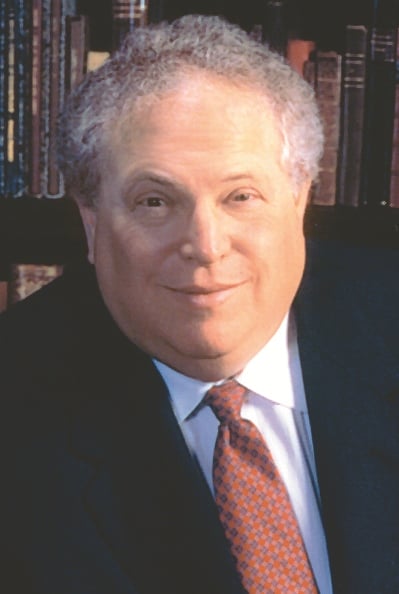 W.R. Berkley Corp. Chairman and CEO William R. Berkley vigorously defended the company's reserving practices on an investor conference call today, stating that, if anything, the insurer leans toward being more conservative.
W.R. Berkley Corp. Chairman and CEO William R. Berkley vigorously defended the company's reserving practices on an investor conference call today, stating that, if anything, the insurer leans toward being more conservative.
"The fact is we have had over seven years of positive development, which I might point out is twice the average duration of our loss reserves," Berkley said.
He added, "It would be hard—in spite of at least one person pointing out that they think we're short of reserves—to continue that process if that were the case. But there are people who write fairytales as well as historical facts."
One analyst that had questioned Berkley's reserve strength was Deutsche Bank's Joshua Shanker, who, according to StreetInsider.com, said in late January, "We believe prior-year reserve deficiencies have been growing at Berkley for three years. While the company continues to report net favorable prior-year reserve development, we note that the amounts are lessening. Further, we believe that reserve releases relate to short-tail lines in recent accident years, and our concerns are over long-tailed reserves for more mature accident years."
In an April 1 Industry Update, Shanker said W.R. Berkley management provided two supplemental schedules of workers' comp data breaking out primary and excess businesses separately. That showed reserves for workers' comp appeared to be redundant by $105 million, rather than deficient by $607 million when analyzed in the aggregate, as was reported in the National Association of Insurance Commissioners' published Schedule P data Deutsche Bank used for its analysis.
But Shanker added in the report that, across all liability lines, the company still appeared to be deficient by about $600 million. "Though we may be less emphatic on our conclusion that reserves are deficient, we still see concerning trends in the data—albeit less than we noted in prior years," the analysis said.
On the Q1 conference call, Berkley said, "We did have a period of time back over 10 years ago when we were concerned about our reserves, and we changed everything we did about our reserving process and practices. So now we have a tendency to be more conservative," which in fact over the long run is probably an additional problem because we end up being more conservative than we would like to be."
For the first quarter, W.R. Berkley CFO Eugene G. Ballard said reserve releases were $25 million compared to $23.5 million in 2013's first quarter. He said over $25 million in domestic insurance reserve releases were slightly offset by "very modest" increases in prior-year reserves for the international and reinsurance segments.
Shanker declined to comment beyond the remarks in the April 1 Industry Update.
Q1 Results
For the first quarter, W.R. Berkley reports net income to common stockholders of $169.7 million, up from $116.6 million in 2013's first quarter.
The combined ratio improved to 93.9 in the quarter, compared to 94.7 a year ago. For domestic insurance, the combined ratio was 92.2, for international insurance it was 99.3 and for reinsurance it was 97.4. The combined ratio increased in both international and reinsurance.
Net premiums written increased to over $1.5 billion from under $1.4 billion a year ago.
State of the market and the "unforeseen event"
Even in the age of analytics and big data, the "unforeseen event" will end up throwing a wrench into insurers' plans and expectations, Berkley said.
Speaking about the state of the market on the company's Q1 results conference call, Berkley said, "The unforeseen event is what changes the pattern of behavior, and the advent of big data and all kinds of analytics—and people's belief in the certainly of such—is taking us down a particular path." He added, "A lot of people have bet big amounts on the certainty of actuarial science and the mathematics of big data," but he noted, "I think what's going to surprise people is that unforeseen event when it comes."
Judging by the history of the insurance industry, Berkley said, "you know [that event is] sitting out there," and even so, he said it "always surprises you."
Regarding the rate environment in the domestic insurance market, COO W. Robert Berkley said on the call it is "modestly more competitive" than the recent past, but he stated it is still possible to raise rates beyond loss-cost trends, and suggested that should continue to be the case for the rest of the year.
"Market conditions are not going to become terribly more competitive," he said.
Expanding on insurers' behavior in the current market, Robert Berkley, speaking generally, said large national carriers appear to be "taking their foot slightly off the rate pedal and looking for ways to not shrink their business as far as count goes" as they continue to grapple with growth and a desire for rate. But he says carriers are being selective, and only becoming "marginally more aggressive" for lines of business they believe they "have their head around."
William Berkley pointed out problems some companies are running into as they enter a new line. He said some companies see classes of business that look attractive, but they enter the "least attractive place" in that business because that is where they can get in. "The differential between good places and good niches and bad has never been greater," he said.
In general, Robert Berkley said casualty business and workers' comp remain "among the most attractive," but he said that can vary by territory or class.
Commercial transportation he called "a great puzzle to us," noting that the line has seemed ripe for more hardening for some time, but has not. He said there is "some commonality with what we saw in workers' comp a few years ago."
Want to continue reading?
Become a Free PropertyCasualty360 Digital Reader
Your access to unlimited PropertyCasualty360 content isn’t changing.
Once you are an ALM digital member, you’ll receive:
- Breaking insurance news and analysis, on-site and via our newsletters and custom alerts
- Weekly Insurance Speak podcast featuring exclusive interviews with industry leaders
- Educational webcasts, white papers, and ebooks from industry thought leaders
- Critical converage of the employee benefits and financial advisory markets on our other ALM sites, BenefitsPRO and ThinkAdvisor
Already have an account? Sign In Now
© 2024 ALM Global, LLC, All Rights Reserved. Request academic re-use from www.copyright.com. All other uses, submit a request to [email protected]. For more information visit Asset & Logo Licensing.








